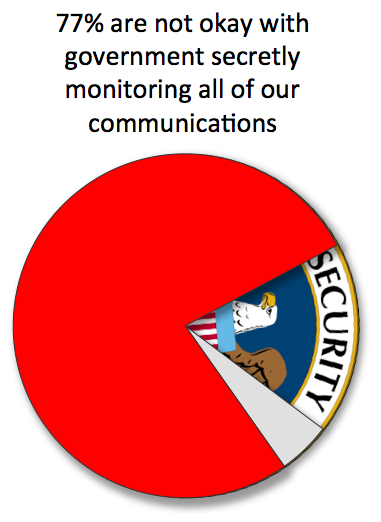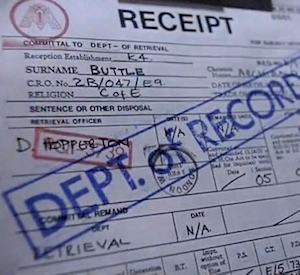[Update November 24: Added link to second part of "Snowden effect" survey results and a podcast: Is NSA Surveillance Affecting Online Behavior?]
On October 26, the 12th anniversary of the signing of the USA Patriot Act, thousands of Americans joined the Stop Watching Us protest in Washington, D.C. The event garnered a lot of media attention and delivered 575,000 signatures on a petition demanding that the U.S. Congress reveal "the full extent of the NSA's spying programs". But do most Americans oppose the kind of mass electronic surveillance that has been revealed by "the Snowden papers"? The answer is a resounding Yes, according to recent survey commissioned by ESET.*
 77% of American adults surveyed disagreed with the following statement: It is okay for my government secretly to monitor all of our communications.
77% of American adults surveyed disagreed with the following statement: It is okay for my government secretly to monitor all of our communications.
While one third said they simply disagreed, an impressive 44% said they strongly disagreed.
The phrase "monitor all of our communications" is rather broad, and we were particularly interested in how the Snowden/NSA revelations might affect online activity, so we got more specific and asked if people agreed with this statement: It is okay for my government to secretly capture data about everyone’s online activities. A solid 76% were not okay with that.
ESET commissioned this survey at the end of last month, just in time for Andrew Lee's keynote at Virus Bulletin 2013 in Berlin. As the CEO of ESET North America, Andrew wanted to draw attention to the issues that the Snowden/NSA revelations have raised for the information security industry, without relying solely on subjective perceptions. For example, while everyone in the security business seems to have been following the Snowden story very closely since it first broke in June, what about the general population? Had most people heard about Snowden and revelations of NSA mass surveillance via the Internet? For 86% of the initial survey audience the answer was Yes.
The Terrorism Factor
What about the intelligence community's efforts to paint the Snowden revelations as damaging to national security? This storyline has been pushed for several months, so have the public bought it? We found opinion on this was split, with a significant number still making up their minds. When asked if the leaks had produced a negative impact on the government’s ability to prevent terrorism 43% disagreed, whereas 40% agreed and a sizable 17% said they didn’t know.
Another government theme, the idea that surveillance is important in the anti-terrorism effort, does have broad support: 65% of respondents agreed that government surveillance helps prevent serious acts of terrorism. However, given some of the other responses, I don't think that support should be taken as a blanket endorsement of all forms of surveillance.
The Us v. Them Factor
As with every survey, there is never enough time to ask all the questions one would like, so it was not possible to discover whether some types of surveillance are more acceptable than others. What was clear is that surveillance of foreigners is a lot more acceptable to Americans than spying on Americans. By a margin of 57% to 34% people agreed that "it is okay for my government to secretly capture data about the online activities of foreign nationals such as people from Iran or China." (9% did not weigh in.)
 Another interesting finding speaks to a phenomenon many of us have observed in conversations about the NSA revelations: the idea that those who have done nothing wrong have nothing to fear from large-scale state intelligence gathering. I tend to think this belief is held by persons who a. feel that they have done nothing that could be construed as "wrong" and b. have not watched the movie Brazil. (That's Brazil, the 1985 film by Terry Gilliam, in which an actual bug in a computer system leads anti-terrorist forces to render and interrogate the innocent Mr. Buttle instead of suspect Tuttle; and not Brazil the country whose leader was spied upon by the NSA, the land wherein resides the reporter who broke the Snowden story: Glenn Greenwald.)
Another interesting finding speaks to a phenomenon many of us have observed in conversations about the NSA revelations: the idea that those who have done nothing wrong have nothing to fear from large-scale state intelligence gathering. I tend to think this belief is held by persons who a. feel that they have done nothing that could be construed as "wrong" and b. have not watched the movie Brazil. (That's Brazil, the 1985 film by Terry Gilliam, in which an actual bug in a computer system leads anti-terrorist forces to render and interrogate the innocent Mr. Buttle instead of suspect Tuttle; and not Brazil the country whose leader was spied upon by the NSA, the land wherein resides the reporter who broke the Snowden story: Glenn Greenwald.)
Here's what we found: 52% of respondents said they agreed that "if you have done nothing wrong then you have nothing to fear from government surveillance." The percentage who disagreed was 44% with 4% undecided.
The Economic Factor
 ESET was certainly not the first to wonder what impact the NSA revelations would have on the Internet economy, which in turn plays a large role in the world economy.
ESET was certainly not the first to wonder what impact the NSA revelations would have on the Internet economy, which in turn plays a large role in the world economy.
For example, the allegations that some American companies were cooperating, with varying levels of reluctance, with the some of the NSA's mass surveillance efforts quickly elicited estimates of how much cloud hosting business could be lost. (See ZDNet: U.S. cloud industry stands to lose $35 billion amid PRISM fallout.)
As a company that sells software designed to make the Internet safer for people, ESET wondered whether people were modifying their behavior in light of the Snowden/NSA revelations.
What we found could be troubling for some industries. We put the question like this: based on what you have learned about government surveillance, do you agree with these statements:
- I have done less banking online: Yes 19%
- I have done less shopping online: Yes 14%
- I am less inclined to use email: Yes 19%
I'm inclined to think that those numbers are bad news for the digital economy, where many business models are predicated on growing levels of activity and engagement over time, not static levels or slowdowns, which those answers represent. In this survey we did not get granular enough to ask if the news of mass surveillance had deterred people from specific actions, like opening a new online account or going paperless with their statements or billing. But I can't see banks or credit card companies cheering the news that roughly one in five adult Internet users people are now doing less online banking, thanks to the actions of the federal government.
If you have thoughts on this topic or want to share any changes you've made to your online activity in light of the coverage of mass surveillance, please leave a comment. There will be more survey stats, and further thoughts on the commercial impact of the Snowden/NSA revelations, in a follow-up blog post later this week.
* Survey of 362 adult Americans, during last two weeks of September 2013.




